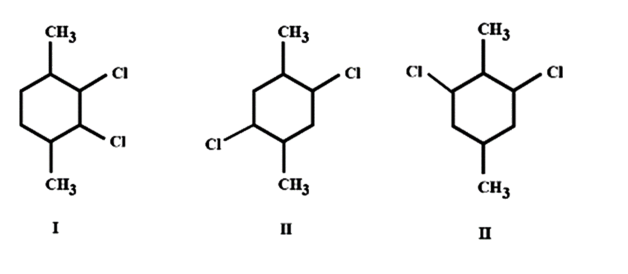Which of the following solutions will have highest boiling point:
1% glucose in water
1% sucrose in water
1%NaCI in water
1% urea in water
The correct Answer is:C
To determine which solution has the highest boiling point, we will analyze the colligative properties of the given solutions. The boiling point elevation (ΔTb) is a colligative property that depends on the number of solute particles (ions or molecules) in a solution.
1. Understand Colligative Properties:
- Colligative properties depend on the number of solute particles in a solution, not on their identity. The boiling point elevation can be expressed as:
ΔTb=i⋅Kb⋅m
where i is the van 't Hoff factor (number of particles the solute dissociates into), Kb is the ebullioscopic constant, and m is the molality of the solution.
2. Identify the Solutions:
- The solutions mentioned in the question include NaCl, glucose, sucrose, and urea.
3. Determine the van 't Hoff Factor (i):
- NaCl: Dissociates into 2 ions (Na⁺ and Cl⁻), so i=2.
- Glucose: Does not dissociate (non-electrolyte), so i=1.
- Sucrose: Also does not dissociate (non-electrolyte), so i=1.
- Urea: Does not dissociate (non-electrolyte), so i=1.
4. Compare the Number of Particles:
- Since NaCl dissociates into 2 ions, it contributes more solute particles compared to glucose, sucrose, and urea, which do not dissociate.
5. Conclusion:
- Among the given solutions, 1% NaCl in water will have the highest boiling point due to the higher number of particles (ions) present in the solution.
Final Answer:
The solution with the highest boiling point is 1% NaCl in water.
- Colligative properties depend on the number of solute particles in a solution, not on their identity. The boiling point elevation can be expressed as:
ΔTb=i⋅Kb⋅m
where i is the van 't Hoff factor (number of particles the solute dissociates into), Kb is the ebullioscopic constant, and m is the molality of the solution.
- The solutions mentioned in the question include NaCl, glucose, sucrose, and urea.
- NaCl: Dissociates into 2 ions (Na⁺ and Cl⁻), so i=2.
- Glucose: Does not dissociate (non-electrolyte), so i=1.
- Sucrose: Also does not dissociate (non-electrolyte), so i=1.
- Urea: Does not dissociate (non-electrolyte), so i=1.
- Since NaCl dissociates into 2 ions, it contributes more solute particles compared to glucose, sucrose, and urea, which do not dissociate.
- Among the given solutions, 1% NaCl in water will have the highest boiling point due to the higher number of particles (ions) present in the solution.
The solution with the highest boiling point is 1% NaCl in water.
Topper's Solved these Questions
- SOLUTIONSBOOK - ALLENCHAPTER - SOLUTIONSEXERCISE - EXERCISE-03
22 Videos
- SOLUTIONSBOOK - ALLENCHAPTER - SOLUTIONSEXERCISE - EXERCISE-04 [A]
17 Videos
- SOLUTIONSBOOK - ALLENCHAPTER - SOLUTIONSEXERCISE - EXERCISE -01
53 Videos
- S-BLOCK ELEMENTS BOOK - ALLENCHAPTER - S-BLOCK ELEMENTS EXERCISE - EXERCISE -3
1 Video
- Some Basic Concepts of Chemistry (Mole concept)BOOK - ALLENCHAPTER - Some Basic Concepts of Chemistry (Mole concept)EXERCISE - All Questions
39 Videos
Similar Questions
Knowledge Check
Which of the following compounds will have highest melting point?
AChlorobenzeneBo-DichlorobenzeneCm-DichlorobenzeneDp-Dichlorobenzene
Which of the following solution have highest boiling point. (Assume all salts completely dissociates)
View SolutionWhich of the following solutions has the highest pH?
View SolutionWhich of the following solutions has highest bolling point?
View SolutionWhich of the following compounds will have highest melting point ?

View SolutionWhich of the following solution will have highest specific conductance?
View SolutionWhich of the following will have the highest boiling point at 1atm pressure?
View SolutionWhich of the following compounds has the highest boiling point ?
View Solution